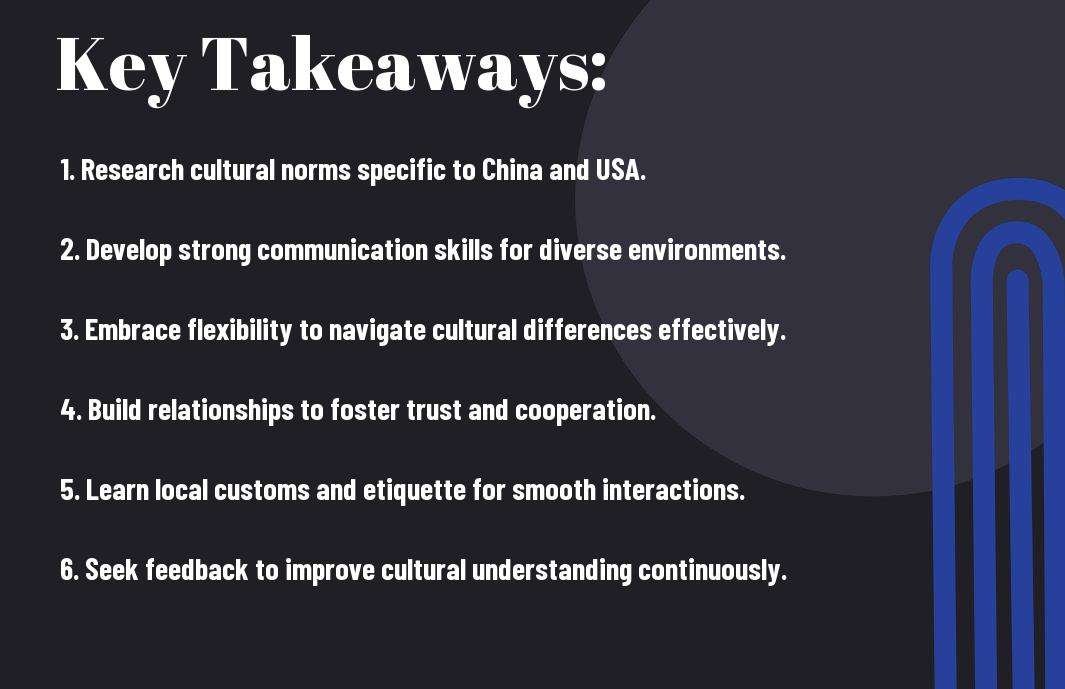You can enhance your career prospects by mastering cultural adaptation when seeking overseas jobs in both China and the USA. Understanding the distinct cultural norms and communication styles of each country will empower you to navigate challenges effectively and foster strong professional relationships. This blog post outlines six vital steps to help you adapt successfully, ensuring that you stand out as a candidate who respects and embraces diverse cultures. By focusing on these strategies, you can turn potential cultural pitfalls into opportunities for growth and connection.

Key Takeaways:
- Understand Local Norms: Familiarize yourself with the cultural expectations and social behaviors in both China and the USA to effectively navigate interactions and build strong relationships.
- Develop Communication Skills: Adapt your communication style to suit the preferences of each culture, recognizing the importance of direct versus indirect communication methods.
- Embrace Flexibility: Be open to adjusting your mindset and approaches to work, as both cultures offer diverse perspectives and practices that can enhance collaboration.
Understanding Cultural Differences
To thrive in overseas jobs, it’s important to grasp the nuances of cultural differences. Engaging with other cultures enables you to adapt your behavior and expectations, paving the way for successful interactions in both China and the USA. This understanding not only enhances your professional relationships but also helps you navigate the complexities of each culture with ease and sensitivity.
Key Cultural Dimensions
Cultural dimensions play a significant role in shaping behaviors and expectations within different societies. By recognizing key aspects such as individualism versus collectivism, power distance, and uncertainty avoidance, you can tailor your approach to better align with the values and customs of your international colleagues. This awareness minimizes misunderstandings and fosters a more harmonious work environment.
Communication Styles
Any successful collaboration hinges on effective communication, which varies significantly between cultures. Understanding these differences will enable you to interact more effectively with colleagues and clients in both China and the USA, enhancing your overall work experience.
In fact, the communication styles in China and the USA can be vastly different. In the USA, you may encounter a direct style that values open dialogue and self-expression. Conversely, in China, the communication often leans towards a more indirect approach, emphasizing harmonious relationships and non-verbal cues. By adapting your communication style, you can avoid potential pitfalls such as misinterpretations or offending others. Acknowledging these differences fortifies connections and positively impacts your cooperation with international teams.
Preparing for Your Move
Clearly, preparing for your move abroad involves more than just packing your belongings. It’s crucial to familiarize yourself with the practicalities of relocating, including securing housing, understanding visa requirements, and managing finances. Adequate preparation will pave the way for a smoother transition and ensure you can focus on adapting to your new environment once you arrive.
Researching the New Culture
Preparing for a new culture involves venturing into the customs, values, and traditions of your destination. Understanding social norms, language nuances, and workplace etiquette will help you navigate interactions more effectively. Familiarize yourself with local history and current events to connect with your new surroundings and foster respectful relationships with locals and coworkers.
Building a Support Network
Researching a support network in your new home is vital for reducing feelings of isolation and enhancing your overall experience. Tap into online communities or local expat groups to connect with others who share your background or interests. This network can provide invaluable resources, such as recommendations for services and insights on cultural nuances.
It is important to actively engage with your support network by attending local meetups and participating in community events. This will help solidify those connections and provide you with a safe space to voice any challenges you face. Building this network also allows you to share experiences and gather positive insights about navigating your new environment. In addition to emotional support, this group can alert you to potential risks and beneficial opportunities in your new location, enhancing your adjustment process.
Navigating Workplace Norms
Unlike many other countries, navigating workplace norms in China and the USA requires a keen understanding of cultural intricacies. You may find yourself needing to adapt your communication style, decision-making approach, and interpersonal interactions significantly. To enhance your skills in this area, Master Resilience to Adapt to New Work Cultures is an excellent resource that can help you thrive in these diverse environments.
Professional Etiquette in China
Along with understanding the importance of hierarchy, you should also embrace the culture of indirect communication and relationship building in Chinese workplaces. Being polite, showing respect for seniority, and establishing guanxi (relationships) are vital for success. Don’t take offense at constructive criticism, as it’s often meant to help you grow.
Professional Etiquette in the USA
For you, grasping the value of direct communication and equality in the workplace is key in the USA. Colleagues often appreciate an open environment where ideas can be freely exchanged. Engaging in casual conversations can foster strong relationships, though it’s wise to be mindful of personal boundaries.
Even in the USA, understanding work-life balance is vital. You’ll find that breaks are important for productivity, and leaving work on time is respected. However, some workplaces may impose overtime expectations without much warning, so be prepared to adapt. Fostering a positive attitude toward teamwork and collaboration is vital, as it leads to a productive atmosphere. Try to be attentive to individuality and diversity, as these are core values that influence many aspects of professional interactions in the USA.
Developing Cultural Intelligence
Despite the challenges that come with working in diverse environments, developing cultural intelligence is necessary for thriving in overseas jobs, especially in China and the USA. Cultural intelligence involves understanding and effectively navigating different cultural norms, values, and practices. As you enhance your ability to relate to and respect differing perspectives, you’ll find it easier to build connections, foster collaboration, and succeed in your international career.
Awareness and Sensitivity
After cultivating a strong awareness of cultural differences, you will begin to recognize how your own background influences your perceptions and interactions. This sensitivity allows you to appreciate and respect the beliefs, customs, and communication styles of others. As you develop this awareness, you’ll be better equipped to engage with colleagues and clients, making it easier to form positive relationships in both China and the USA.
Skills for Effective Adaptation
On your journey to master cultural adaptation, it’s necessary to acquire specific skills that facilitate effective communication and collaboration. These skills include adaptability, active listening, and emotional intelligence. As you practice these abilities, you will navigate multicultural environments more smoothly, allowing you to respond appropriately to diverse situations and minimize misunderstandings.
It’s vital to cultivate adaptability in the face of changing cultural contexts, as this enables you to adjust your approach based on varying norms and expectations. Additionally, active listening will enhance your interactions, allowing you to fully comprehend messages beyond just words. Emotional intelligence is another key skill; by understanding your own emotions and those of others, you can better manage interpersonal dynamics. Together, these skills create a strong foundation for successful cultural adaptation, empowering you to thrive in both China and the USA.
Strategies for Effective Integration
Many individuals seeking overseas jobs in China and the USA find that adapting to a new culture requires deliberate strategies. To enhance your experience, consider Mastering Cultural Adaptation: Tips for Smooth Transitions. Engaging with local customs, participating in community events, and establishing connections with locals can greatly ease your adjustment.
Engaging with Local Communities
One of the most effective ways to integrate into a new culture is by actively participating in local communities. Attend local events, engage in volunteer activities, or join clubs that match your interests. Building relationships with locals will not only improve your understanding of the culture but also create a sense of belonging.
Continuous Learning and Feedback
Among the best strategies for successful cultural adaptation is embracing continuous learning and feedback. Seek constructive criticism from peers and mentors about your interactions and behaviors. This open-minded approach allows you to make adjustments based on real experiences, enhancing your cultural competence.
And by consistently asking for feedback, you can identify specific areas for improvement, allowing you to navigate potential misunderstandings. Engage actively with peers, who can offer valuable perspectives, and be open to suggestions. This proactive stance will help you avoid cultural faux pas, providing a positive impact on your professional relationships and personal growth. Embracing ongoing learning not only fosters adaptability but also cultivates a strong appreciation for different cultural norms.
Overcoming Challenges
Now, overcoming challenges in cultural adaptation is vital for success in overseas jobs. Engaging with cultural differences may seem daunting, but resources like Mastering Recruitment in China: Strategies for Urban and Emerging Markets can provide valuable insights. By embracing these challenges, you enhance your adaptability and grow both personally and professionally.
Addressing Culture Shock
Culture shock is a common experience when moving to a new country. It can be uncomfortable, leading to feelings of anxiety and disconnection. Embracing local customs, seeking support from fellow expatriates, and maintaining open communication can help ease your transition.
Managing Expectations
Expectations play a significant role in your adaptation process. If you have unrealistic views about your new environment, you may face disappointment. Setting realistic expectations will help you remain grounded and focused on achieving your goals, fostering a smoother transition.
Understanding your new surroundings requires patience and flexibility. Being open to different perspectives allows you to navigate challenges effectively. It’s important to recognize that misunderstandings may arise and progress may take time. By fostering positive relationships with locals and colleagues, you’ll cultivate a sense of belonging. Embrace the to learn and grow from each experience, as they contribute to your personal and professional development.

Final Words
As a reminder, mastering cultural adaptation for overseas jobs in China and the USA involves understanding local customs, improving communication skills, engaging with local communities, being open-minded, developing emotional intelligence, and seeking feedback. Each of these steps will empower you to navigate the complexities of a new cultural landscape effectively. By actively implementing these strategies, you will enhance your professional experience and establish meaningful connections in your new environment, ensuring a successful transition in your career.







